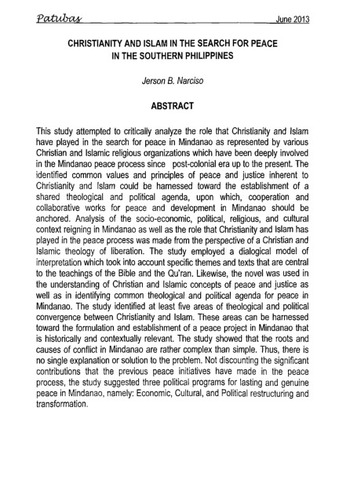Показать сокращенную информацию
Christianity and Islam in the search for peace in the Southern Philippines
| dc.contributor.author | Narciso, Jerson B. | |
| dc.coverage.spatial | Mindanao | en_US |
| dc.date.accessioned | 2021-03-22T07:04:36Z | |
| dc.date.available | 2021-03-22T07:04:36Z | |
| dc.date.issued | 2013-06 | |
| dc.identifier.citation | Narciso, J. B. (2013). Christianity and Islam in the search for peace in the Southern Philippines. Patubas, 6(1), 39-55. | en_US |
| dc.identifier.issn | 1908-515X | |
| dc.identifier.uri | https://hdl.handle.net/20.500.12852/638 | |
| dc.description | Journal article | en_US |
| dc.description.abstract | This study attempted to critically analyze the role that Christianity and Islam have played in the search for peace in Mindanao as represented by various Christian and Islamic religious organizations which have been deeply involved in the Mindanao peace process since post-colonial era up to the present. The identified common values and principles of peace and justice inherent to Christianity and Islam could be harnessed toward the establishment of a shared theological and political agenda, upon which, cooperation and collaborative works for peace and development in Mindanao should be anchored. Analysis of the socio-economic, political, religious, and cultural context reigning in Mindanao as well as the role that Christianity and Islam has played in the peace process was made from the perspective of a Christian and Islamic theology of liberation. The study employed a dialogical model of interpretation which took into account specific themes and texts that are central to the teachings of the Bible and the Qu’ran. Likewise, the novel was used in the understanding of Christian and Islamic concepts of peace and justice as well as in identifying common theological and political agenda for peace in Mindanao. The study identified at least five areas of theological and political convergence between Christianity and Islam. These areas can be harnessed toward the formulation and establishment of a peace project in Mindanao that is historically and contextually relevant. The study showed that the roots and causes of conflict in Mindanao are rather complex than simple. Thus, there is no single explanation or solution to the problem. Not discounting the significant contributions that the previous peace initiatives have made in the peace process, the study suggested three political programs for lasting and genuine peace in Mindanao, namely: Economic, Cultural, and Political restructuring and transformation. | en_US |
| dc.language.iso | en | en_US |
| dc.publisher | Central Philippine University | en_US |
| dc.rights | Attribution-NonCommercial-NoDerivs 3.0 Philippines | * |
| dc.rights.uri | http://creativecommons.org/licenses/by-nc-nd/3.0/ph/ | * |
| dc.subject.lcsh | Christianity | en_US |
| dc.subject.lcsh | Islam | en_US |
| dc.subject.lcsh | Christianity and other religions | en_US |
| dc.subject.lcsh | Christianity and other religions--Islam | en_US |
| dc.subject.lcsh | Islam--Relations--Christianity | en_US |
| dc.subject.lcsh | Christians | en_US |
| dc.subject.lcsh | Muslims | en_US |
| dc.subject.lcsh | Peace | en_US |
| dc.subject.lcsh | Peace--Religious aspects | en_US |
| dc.subject.lcsh | Philippines--Mindanao Island | en_US |
| dc.title | Christianity and Islam in the search for peace in the Southern Philippines | en_US |
| dc.type | Article | en_US |
| dc.citation.firstpage | 39 | en_US |
| dc.citation.lastpage | 55 | en_US |
| dc.citation.journaltitle | Patubas | en_US |
| dc.citation.volume | 8 | en_US |
| dc.citation.issue | 1 | en_US |
Файлы в этом документе
Данный элемент включен в следующие коллекции
-
Journal articles [28]
-
Patubas [110]
Patubas is a refereed research journal of Central Philippine University.






